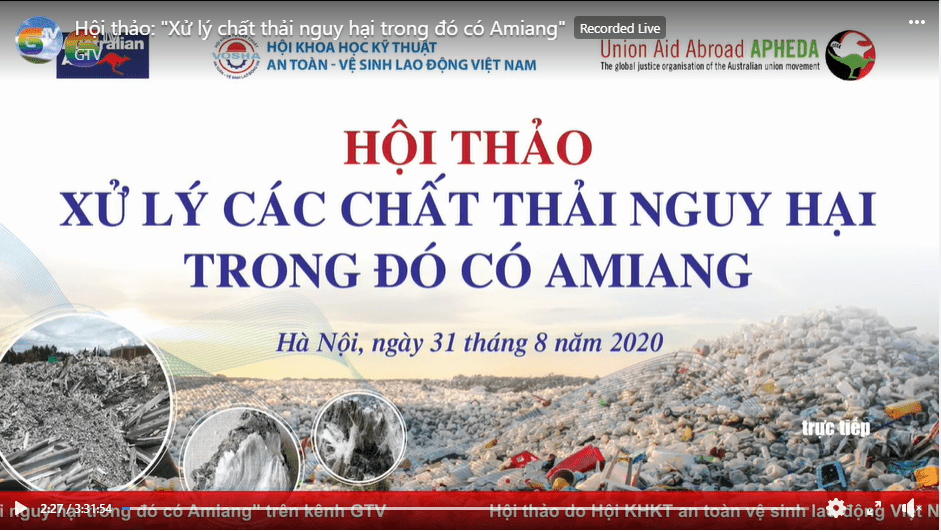Hanoi Workshop: “Handling Hazardous Waste Including Asbestos”
On 31 August 2020, the Vietnam Association for Occupational Safety and Health (VOSHA), Institute of Natural Resources, Environment and Community Development (IRECO) in collaboration with the Union Aid Abroad – APHEDA organised the “Handling Hazardous Waste Including Asbestos” workshop. The workshop was held in Hanoi with around 40 delegates from Civil Society Organisations, Government agencies, university and press agencies all participating.
Overview of asbestos use in Vietnam
Over the last decade Vietnam has been among the top seven countries using the most asbestos globally. Around 90% of the deadly fibre is used in the construction sector. White asbestos is commonly used in the production of roofing sheets and insulation materials with the roofing sector using around 75-80 million square metres of asbestos cement roofing sheets. Asbestos is also in the production of gaskets and brake pads for vehicles.
Vietnam’s approach to hazardous waste management under the spotlight
At the workshop, delegates were provided information about the current situation of hazardous waste and asbestos waste management in Vietnam. Also covered was hazardous waste treatment solutions, safety in hazardous waste management, and the safe disposal and removal of Asbestos Containing Materials from experts of Trade Union University, VOSHA, and IRECO.
Professor Dr. Le Van Trinh, Chairman of VOSHA, said that ‘although legal documents on hazardous waste treatment in Vietnam are extensive, there is not much talk about asbestos’. He also suggested that ‘lawmakers soon put asbestos into a hazardous waste, and take measures to warn people not to use it arbitrarily, to stop using asbestos…’ (KhinteDothi news)
The workshop drove discussion around the collective benefit on policy making processes, the importance of having a robust communication campaign for both consumers and law-makers, and the overarching concept that Vietnam must treat asbestos waste the same as any other hazardous waste. The impact of asbestos and asbestos-related disease was also raised:
“The health sector needs to improve early diagnosis, treatment and functional rehabilitation techniques for asbestos-related diseases. At the same time, establish asbestos data source centers to register, monitor and supervise treatment for people exposed to asbestos”- Ms. Truong Thi Yen Nhi, Trade Union University (KhinteDothi news)
The workshop was live streamed on GTV Channel on Facebook and got about 15.000 views with comments, shares and reactions. *Note: video is in Vietnamese language.
Take action on Asbestos!
- Sign our petition to stop International Development Banks funding asbestos products in Indonesia and other countries. Removing this funding will shrink the market and promote alternative products.
- Join the campaign: Asbestos. Not Here. Not Anywhere.
Join the Campaign to Ban Asbestos
We are building a movement of people in Australia to join with unionists and campaigners across South East Asia to support their struggle to ban asbestos and eliminate asbestos-related diseases. We want to secure an asbestos-free future because as long as asbestos is being used anywhere, it remains a risk everywhere.
